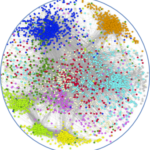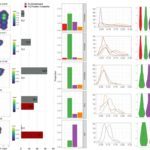Link to Pubmed [PMID] – 38033043
Link to DOI – 10.1371/journal.pone.0294868
PLoS One 2023 ; 18(11): e0294868
Streptococcus gallolyticus sp. gallolyticus (SGG) is a gut pathobiont involved in the development of colorectal cancer (CRC). To decipher SGG contribution in tumor initiation and/or acceleration respectively, a global transcriptome was performed in human normal colonic cells (FHC) and in human tumoral colonic cells (HT29). To identify SGG-specific alterations, we chose the phylogenetically closest relative, Streptococcus gallolyticus subsp. macedonicus (SGM) as control bacterium. We show that SGM, a bacterium generally considered as safe, did not induce any transcriptional changes on the two human colonic cells. The transcriptional reprogramming induced by SGG in normal FHC and tumoral HT29 cells was significantly different, although most of the genes up- and down-regulated were associated with cancer disease. Top up-regulated genes related to cancer were: (i) IL-20, CLK1, SORBS2, ERG1, PIM1, SNORD3A for normal FHC cells and (ii) TSLP, BHLHA15, LAMP3, ZNF27B, KRT17, ATF3 for cancerous HT29 cells. The total number of altered genes were much higher in cancerous than in normal colonic cells (2,090 vs 128 genes being affected, respectively). Gene set enrichment analysis reveals that SGG-induced strong ER- (endoplasmic reticulum) stress and UPR- (unfolded protein response) activation in colonic epithelial cells. Our results suggest that SGG induces a pro-tumoral shift in human colonic cells particularly in transformed cells potentially accelerating tumor development in the colon.











